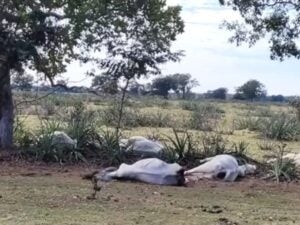Earlier this year, Brazilian farmers lost nearly 50 percent of their corn production after January frosts hit the country hard. Now, their cattle are being affected by another bout of frigid weather.
Nearly 3,000 head of cattle are reported to have passed away from hypothermia in Mato Grosso do Sul, Brazil’s fourth-largest beef exporting state this week after temperatures dropped to between 6 and 9 degrees Celsius.
Farmers in the area were reported to have lit bonfires to try to keep their herds warm.
“It’s very cold on the open plains. As the biome is flooded, humidity increases and the wind gets colder and colder,” said one Brazilian expert. “The animals don’t have much shelter, and they end up dying.”

Brazil’s state agency for Animal and Vegetable Sanitary Defense of Mato Grosso Del Sul region confirmed the deaths in a statement on Wednesday.
While the losses represent just a small portion of Brazil’s herd of about 224 million head, their uncharacteristic death has drawn attention. Consequences for packers and exports are anticipated to be minimal.
The Brazilian veterinary agency has advised farmers to bury the cattle two meters deep in a pit large enough to accommodate the number of deceased cattle.
Brazil is the largest global exporter of beef. In just the first two months of 2023, the country exported over 286 thousand tons of beef.
But losses like this aren’t typical. The average temperature this time of year ranges from 10 to 20 degrees warmer than the cold front. One of the country’s animal experts indicated that Brazilian cattle, while well adapted to hot temperatures, are not as good at withstanding cold spells.
The dead cattle were reported as not fit for sale, and represent an estimated loss of $1 million to farmers in the area.


